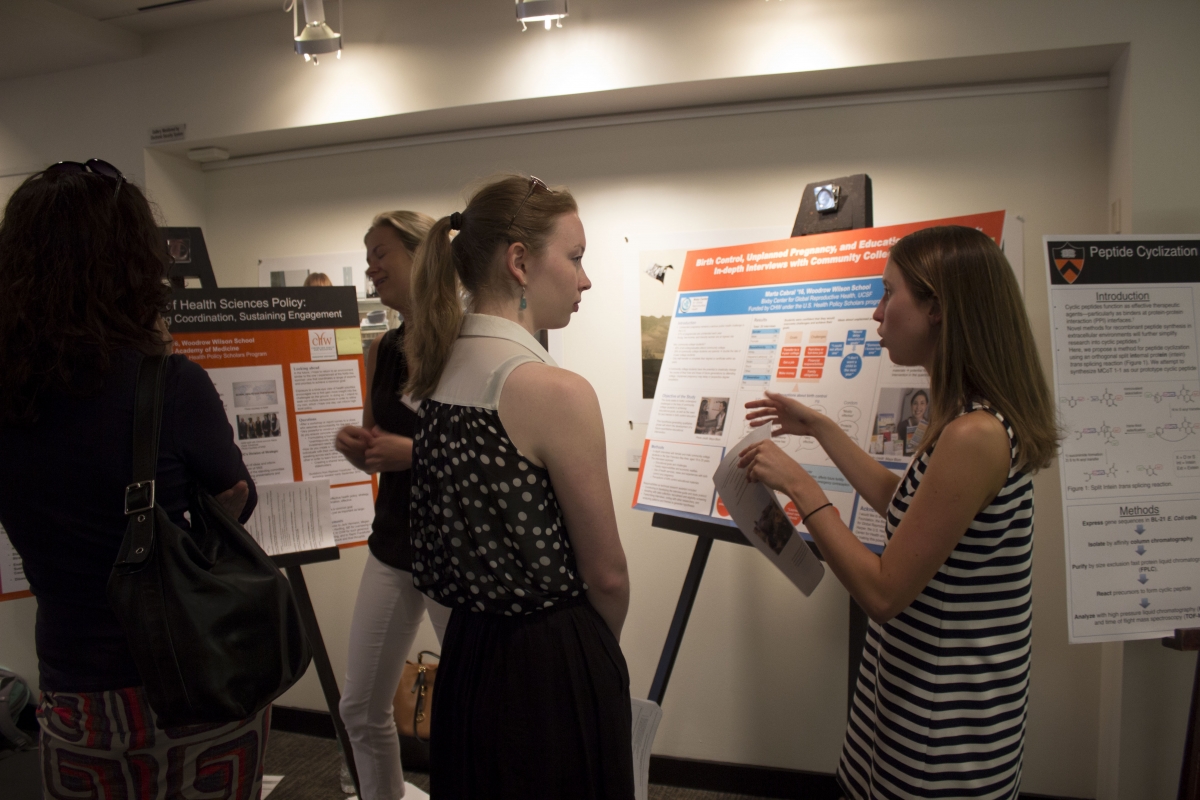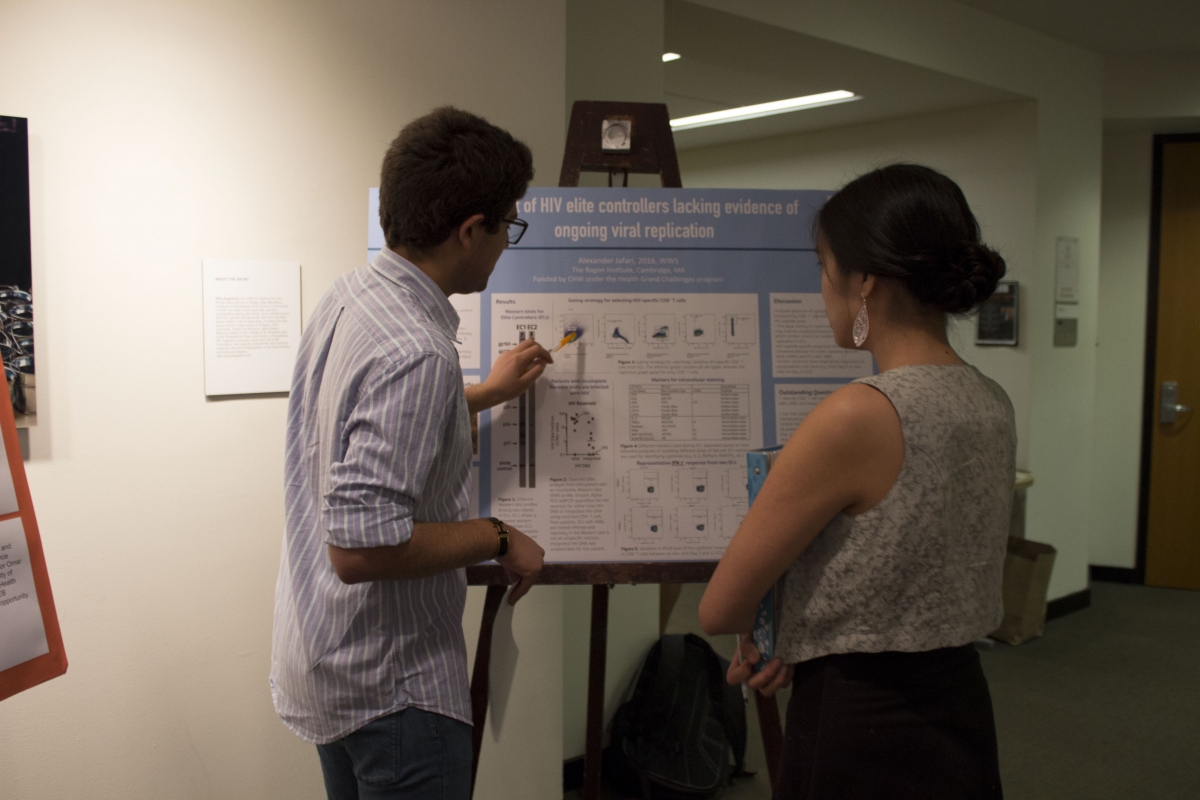As students mounted their posters and prepared their short films – the physical manifestations of a summer well-spent – the Woodrow Wilson School’s Robertson Hall lobby and Bernstein Gallery quickly became the stage for Princeton’s latest student research symposium.
Sponsored by the Center for Health and Wellbeing (CHW), the Sept. 18 symposium featured the work of students who conducted research projects and participated in summer internships sponsored by the global health and U.S. health policy programs. The event, which was held in partnership with campus organizations including International Internship Program (IIP), Princeton Internships in Civic Service (PICS), Princeton in Asia (PiA), the Community-Based Learning Initiative (CBLI) and the Keller Center, was open to students, faculty and invited guests.
“The CHW programs make it possible for any student to have a transformative experience in many places around the world,” said Kristina Graff, director of global health programs at CHW. “This experience shapes their understanding of global health.”
This year, the CHW symposium took on the face of a research conference. The event was designed to inspire active engagement between students and faculty of different departments and showcase the exciting independent work of students in global health and health policy research that had been pursued both domestically and abroad. Throughout the symposium, attendees and student participants evaluated posters on a number of dimensions, including: technical content such as the hypothesis, organization and correct interpretation of data; presentation quality such as clarity of communication, recognition of project limitations and thoroughness; and creative impact and originality.

Within a three-hour session, 72 undergraduate students and 14 graduate students from such departments as the Wilson School, neuroscience, Spanish and Portuguese, anthropology, molecular biology, politics, economics, chemistry and more presented posters and short films on their summer research. The organizations hosting student internships included Population Services International in Phnom Penh, Cambodia; the Bureau of Population, Refugees & Migration in Washington, D.C.; the University of Calgary in Canada; the Green Mountain Care Board in Montpelier, Vermont; the University of Antioquia in Colombia; and the Humanitarian Organization for Home Economics in Singapore and more.
For some students, this was the first opportunity to present independent work and experiences abroad to their fellow classmates and professors. For others, this was the first reveal of senior thesis research that would be further developed in the following academic year.
“For many of our students, this is the first time they’ve ever been to a resource-poor country, the first time they’ve ever been involved in global health research and the first time they’ve ever gone through the poster- and video-making and presenting process,” said symposium organizer Kimberly Bonner, research associate with Médecins Sans Frontières (MSF) Access Campaign and departmental guest at CHW. “It ends up being inspiring even for those outside of the global health and policy field as they get to see their classmates doing meaningful work across a variety of disciplines.”

For Amalya Megerman ’16, an anthropology major, her experience at the symposium gave her the opportunity to reflect on the impact her research could have within her community of interest – China. She had traveled to Jishou, China, to study the student experience of academic pressure and the underlying causes of student suicides on campuses, such as parent-child and teacher-student relationships.
“I was lucky to be working with students that I had worked with in a previous summer,” Megerman said. “I was able to connect with them in a very deep way, and they began sharing personal experiences regarding how they connect to their parents and teachers. It was an incredibly intimate experience that gave me insight into the culture behind social statuses, respect, financial viability, depression and the focus on education.”
The research of Marta Cabral ’16, a Woodrow Wilson School major with a creative writing certificate, highlighted the incentive to develop successful, empowering intervention control strategies in low-income community colleges. She worked in partnership with the Bixby Center for Global Reproductive Health at the University of California, San Francisco. After having developed a foundation for the topic of birth interventions in her first junior independent work paper on abortions, she applied for and received independent project funding through CHW for her experience and work in San Francisco. In her first few visits to her study location — a community college near UCSF — for field work, Cabral found the student population was interested in learning more about reproductive and preventative health. She hopes to continue this work after graduation.
Another student, Roberta Hutton ’16, an ecology and evolutionary biology major, traveled to Medellín, Colombia, to study health related to two prominent South American endemics caused by insects: Chagas Disease, which is transmitted by bloodsucking bugs, and Dengue Fever, a mosquito-borne disease. Hutton designed a survey that would represent a distribution of the population of interest. There, she came across many research challenges often experienced by field scientists and had the chance to explore possible solutions during her time in Colombia as well as in conversation with attendees at the symposium. For example, Hutton discussed the accuracy of certain survey translations from English to conversational Spanish, the necessity to maintain a level of freshness and engagement with each subsequent interviewee and the challenges in understanding how to deal with potentially impure results.
“It’s interesting,” Hutton said, “to see that sometimes your work requires you to target the population that stands to benefit from your research the most, but may also give you less pure results when answering the survey.”

For Matthew Kelly ’16, a Woodrow Wilson School major, his summer plans took him to a consulting internship in Johannesburg, South Africa, that dealt with providing healthcare and early child development services despite poor government funding or basic, across-sector resources. While the initial approach involved much larger-scale, upper-level restructuring, Kelly’s experience with community members encouraged him to take an asset-based approach that recognized NGO staff members’ inherent skills that could flourish with further development and organization.
For example, Kelly found staff members who were great writers, but they hadn’t been trained in how to do grant-writing for the NGO. And so, Kelly helped to write up a funding application guide and facilitated a writing skills workshop for the staffers. In exemplifying the sensitivity and flexibility necessary to tackle global health issues and organization restructuring, Kelly’s experience in Johannesburg was one of empowerment – of identifying the asset within the NGO’s high-quality programs and guiding them to new solutions, such as better budgeting and branding, built on their existing framework.
“That’s what’s great about the symposium. These summer experiences often disrupt students’ original plans for their future careers. It blows wide open their understanding, their maturity, their awareness and their way of thinking about global health,” Graff said. “It makes them think, ‘Now that I’ve seen this, I want to change my angle,’ and this event gives them the chance to share their stories with other members of the university community.”
Winners
Based on the evaluations completed by the symposium attendees, the winner for the undergraduate poster contest was Ashley Wang ’16, a chemistry major, for her poster on “Synthesis and Incorporation of Truncated Autoinducing Peptide on Surfaces to Inhibit Staphylococcus Aureus Virulence Pathway.”
The co-winners for the graduate student poster contest were Diane Alexander, an economics major, for her poster on “Do Doctors Engage in Risk Selection? Unintended Consequences of Paying Doctors to Reduce Costs,” and Benjamin Winer, a molecular biology major, for his poster on “Towards a small animal model for hepatitis B: Identification of human host factors required for hepatitis B virus entry.”
The winner for the video presentation was graduate student, Heath Pearson, an anthropology major, for his film titled, "A Day: Care Without a Car - Traveling to Access Health Care in Rural NJ."
The winner for the photo contest was Helena Hengelbrok ’16, an anthropology major, and runner-up was Kerith Wang ’16, an ecology and evolutionary biology major.

